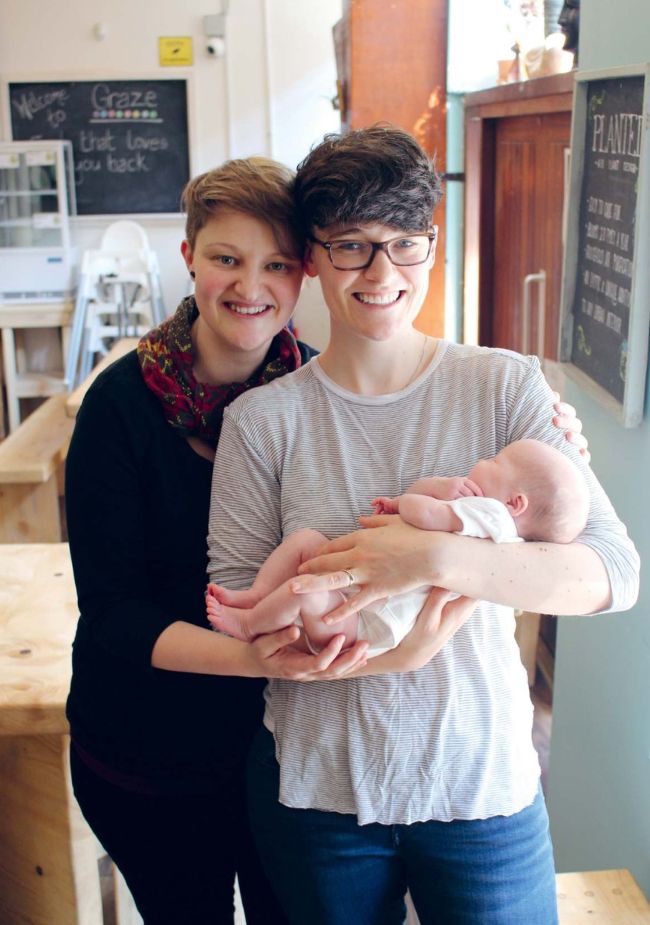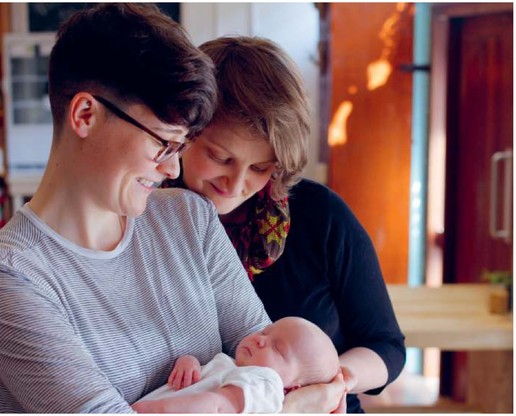Parenting Update
Even though legislation to grant parenting rights to LGBT+ families was passed in 2015, before the marriage equality referendum happened, parents are still waiting for rights and recognition. Anna Mac Carthy Adams gives an overview of the current complex legal situation for LGBT+ parents.
The law that would recognise me as a parent was passed before my daughter was conceived, but she’ll be nearly two years old before I’ll be legally recognised as her parent, if the current timeframe is to be trusted. We could not have envisioned that the legislation would take so long to commence and many LGBT+ families are now uncertain as to how to best access legal protections for their relationships with their children.

Aoife O’Driscoll, Anna Mc Carthy Adams, and baby Finn
The practicalities of implementing the Children and Family Relationships Act, which was passed in 2015, before the marriage equality referendum happened and which will grant many people a legal relationship to their child, are still being worked on by various government departments. People are still without the much sought after and much fought for legal protections that the law offers. Before delving into the detail of what we’re waiting on, let’s look at what is available to parents right now.
GUARDIANSHIP
The person who gives birth to a child is automatically the child’s legal mother and guardian. If she is married to a man, her husband is presumed to be father, and he is thus also a guardian, but this presumption does not apply to same-sex couples (even where married or civilly partnered).
A same-sex couple in a relationship (either married, civilly partnered or living together for three years) who have conceived through assisted human reproduction (AHR) at a clinic, or who have been raising their child together for more than two years, can apply to court for guardianship. Although the legislation requires parents to be raising the child together for two years, judges seem to be using their discretion and granting guardianship before the two year period is up.
Guardianship, however, is not parentage and does not confer all the rights of parentage. There are also two types of guardianship. One version carries more rights and responsibilities than the other. If you do decide to apply for guardianship, be sure to ask for guardianship with no restrictions. The crucial point about both types of guardianship is that once the child turns 18 the guardianship ceases and there is no longer a legal relationship between the two people.
It costs nothing to apply for guardianship and you don’t need a solicitor to apply. Call up your local family law court or district court (in Dublin this is Dolphin House) and the staff can help direct you to the correct forms needed.
CHILDREN AND FAMILY RELATIONSHIPS ACT, 2015
The parts of the legislation most relevant to parents who conceived through AHR are yet to be commenced and it seems that there is no political urgency here.
The government reaped the feel-good rewards of the successful marriage referendum and are seemingly relying on the fact that most people assume that all the legal protections are in place and accessible. Many parents I speak to are frustrated that the law has been passed but the timeline for it to be a reality keeps shifting. Now the official timeline given by the Department of Health is the end of 2017. However this timeline seems unrealistic given all that has to happen during that time period, which includes the Christmas and New Year holidays.
The Department of Health is working on regulations which will establish the Donor Register, which will record the various details of children born through the use of donor egg and/or sperm or embryo after the Act is commenced. The main obstacle at the moment is with the Office of the Parliamentary Counsel (OPC), which needs to approve the Department of Health’s work.
The OPC are currently raising legal queries on aspects of the work and discussion is apparently ongoing between the office and the Department of Health. Once the OPC is satisfied with the regulations it has to lay them before the Houses of the Oireachtas for TDs and Senators to raise questions or suggest changes. This process will take no longer than 21 days, once the regulations are laid before the houses.
At the same time the Courts Service are writing the court rules that would allow people whose children were conceived through AHR (performed either in Ireland or abroad), where the AHR act is carried out before the Act is commenced, to apply for a Declaration of Parentage. Court ordered declarations of parentage will be available in relation to children conceived using anonymous donors or donors whose identity can be made known to the child when they are 18 (known as ‘non-anonymous’ donor sperm).
However a court order for parentage will not be available where the donor is or was known to the parents at the time of the procedure and/or court application. Parents in this situation may wish to consider the adoption route to parentage.
Children conceived through an AHR procedure which takes place after the Act is commenced may not have to apply to court for a declaration and recognition may be automatic, but that remains to be confirmed.
For children conceived after the Act is commenced, certain criteria have to be met in order to gain parentage – the procedure must be carried out in Ireland in a fertility clinic or hospital and not abroad (though the donated sperm, eggs or embryo may be sourced overseas). All of the relevant parties must consent to the procedure and to the assignment of legal parentage. The donor must agree that he or she will not be treated as a legal parent of the child. Additionally, anonymous donations are prohibited under the Act; the child will have a right to find out the donor’s identity once turning 18.

I know of some families who have travelled abroad to avail of reciprocal egg transfer procedures in particular, since clinics in Ireland will not conduct them. I would caution that once the Act is commenced it seems that the non-birth parent in these situations may not be able to apply for a declaration of parentage. If couples are considering using fertility services abroad, I would recommend doing so before the Act is commenced, otherwise guardianship or adoption may be the only options available in terms of rights.
Another arm of the State involved in implementing this legislation is the Registrar of Births who are putting together their own rules on what documents they may require to recognise second parents. It is likely that once a Declaration of Parentage is granted a second parent can apply to have their name included on their child’s birth cert. It is expected that the cert will say the name of the parent who gave birth under ‘Mother’ and the second parent under ‘Parent’.
Once all these various government departments have finalised their procedures the Minister for Justice will commence parts two and three of the Act and people can apply for rights under its provisions. Realistically, it could be a few months into 2018 before we’ll see the Act commenced.
ADOPTION
The Adoption (Amendment) Act 2017, recently passed by the Oireachtas, contains many positive provisions for LGBT+ families. Same-sex couples can now apply as couples to adopt.
Many parents who are already parenting their child and who are waiting on the commencement of the Children and Family Relationships Act are wondering should they apply to adopt their child while they are waiting. While it is open for parents to do that, I would caution that the adoption process can be arduous, long and invasive.
In addition, Tusla don’t appear to have established their own process around second parent adoptions at the moment. Parents who are contacting them are being told to wait to be invited to group meetings at which information on the process will be given. These meetings don’t appear to have been set up yet and so the wait continues.
Personally, I’ll be waiting for the Children and Family Relationships Act to be commenced and not applying for adoption just yet. Given the limited resources that Tusla is working with, it makes little sense for parents, whose rights could be granted relatively quickly under the Children and Family Relationships Act, to be considering applying through the adoption route.
For couples who are not currently parenting children and who would like to be considered as adoptive parents, contact your local Tusla office to start the assessment process.
SURROGACY
Families who have availed of surrogacy are still waiting for the relevant legislation to be drafted and so they remain in an uncertain legal situation. The draft outline of the surrogacy law has been published, but there is no timeline yet on when the full piece of legislation might be published. If you would like to submit comments on the heads of bill of the surrogacy act contact the clerk of the Oireachtas Committee on Health at health@oireachtas.ie.
How can these various pieces of legislation and related regulations be moved to completion faster? Email, call, and write to your local representatives and to the relevant Ministers involved – Health, Social Protection and Justice. As the situation unfolds around the various pathways to parentage, GCN will be publishing articles to keep the community as up to date and informed as possible. I’ll also be working with community organisations on publishing an informational booklet which will aim to provide some guidance to families as to their options.
This article is not legal advice and is not intended as legal advice. It is best to contact a legal professional if you need legal advice on these matters.